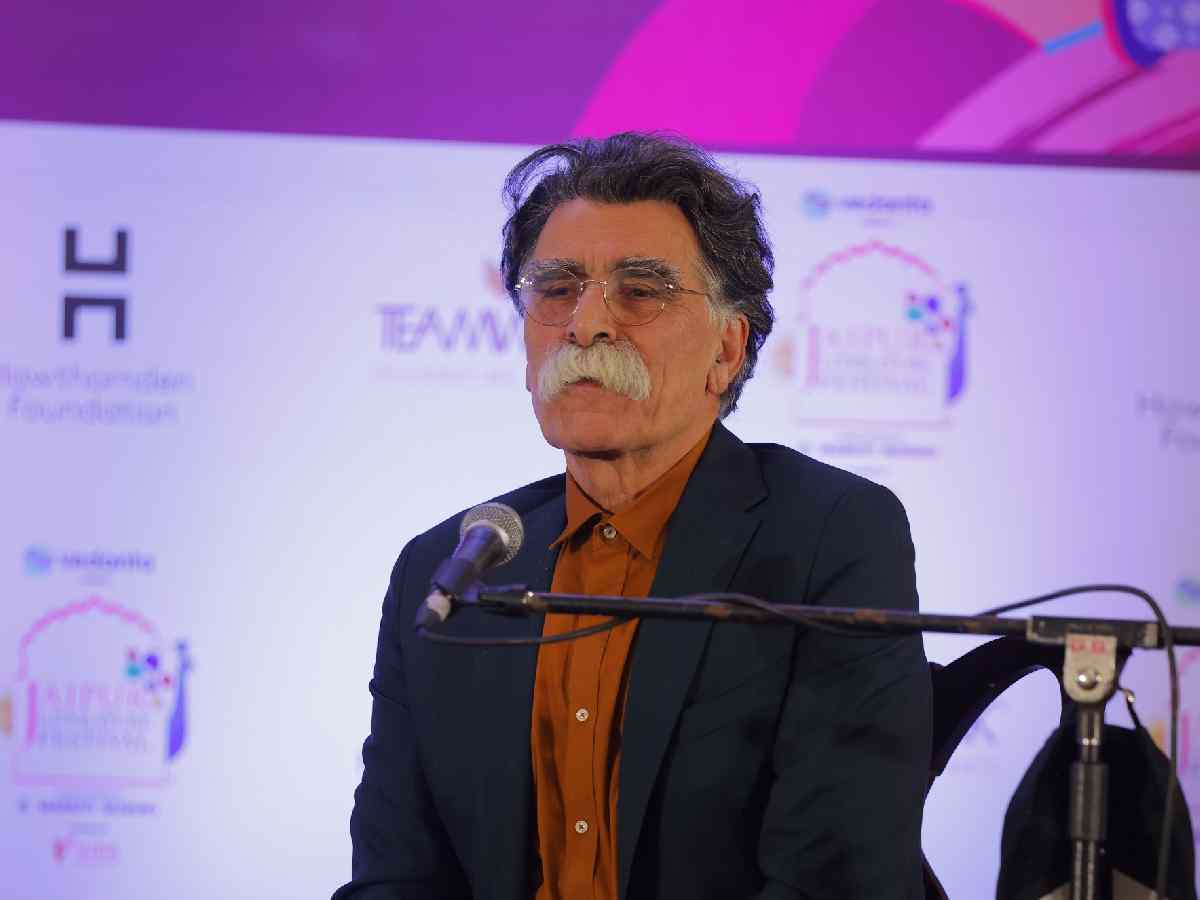
At the Jaipur Literature Festival 2025, Kader Abdolah stood before an audience that hung on to his every word. In a session presented by the Embassy of the Netherlands, New Delhi at the festival, the celebrated Iranian-Dutch author, known for his lyrical storytelling and evocative narratives, spoke of exile—not just as displacement but as a transformation. His journey—from a young revolutionary in Iran to one of the most celebrated authors in the Netherlands—is as compelling as the stories he weaves in his novels.
Forced to flee Iran, he arrived in the Netherlands at 33, unable to speak a word of Dutch. Yet, rather than allowing language to become a barrier, he embraced it as a vehicle for reinvention. Today, his works, including The House of the Mosque, are widely regarded for their poignant narratives and their ability to bridge the cultural and historical gaps between East and West.
But beyond the literary acclaim, Abdolah’s story is one of resilience—the remarkable journey of a man who built a new home not in a place, but in words.
A new language, a new life
Sitting down with Patriot for a conversation, Abdolah reflected on the defining moment when he realised that mastering Dutch was not just necessary—it was essential to his very existence.
“I had no idea where I would end up,” he admitted. “But suddenly, I was in the Netherlands, and there was only one way to live: through the Dutch language.”
His ability to wield a new tongue with literary finesse was shaped, in part, by an unexpected influence—his father, who was deaf and did not use spoken language.
Also Read: Delhi: ASI’s night tourism initiative struggles to attract visitors
“Our family had developed a language of about 300 to 400 gestures,” he shared. “Because of that, my mind learned to express deep emotions in simple terms. When I started writing in Dutch, I thought—maybe I can do the same with this language.”
This skill—distilling complex emotions into clear, evocative language—became the foundation of his writing. With relentless determination, he taught himself Dutch and, over time, penned more than 30 books. Today, his novel The Eyes of the Mosque is considered one of the finest works in Dutch literature, a testament to his ability to merge Persian storytelling traditions with the crisp clarity of Dutch prose.
Weaving East and West
Despite adopting Dutch as his literary language, Abdolah never severed ties with his Persian heritage. Instead, he crafted a new literary landscape where both cultures coexisted, enriching one another.
“In Iran, we have mountains that soar to 6,000 metres. In the Netherlands, the highest peak barely reaches 60 metres,” he said, smiling. “So, I brought the mountains of my homeland into Dutch literature. I placed veiled Persian women in Dutch stories. I infused Dutch rivers with the music of Persian poetry.”
This blending of traditions has not only enriched Dutch literature but also provided readers with fresh perspectives.
“I am not the best Dutch writer,” he admitted with characteristic humility, “but I am a new voice. And the taste of something new is the taste of change.”
The transformation of self through language
For Abdolah, writing in Dutch became more than an act of survival—it was a journey of transformation, reshaping not just his prose but his identity.
“For 30 years, I have written day and night in Dutch,” he reflected. “But I didn’t realise that the Dutch language was also rewriting me. It changed my thinking, my writing, even my identity. Through this language, I met a new version of myself.”
Yet, the question of returning to Iran remains a complicated one. For many exiled writers, the dream of going home is shadowed by the reality of irreversible change.
“It’s a dangerous question,” he said solemnly. “Many exiled writers dream of going back. But when they do, they find that everything has changed—including themselves. If I return, I will be a foreigner in my own land. I could write a book in Persian, but I can no longer put my soul into it.”
A home in literature
Despite the pain of exile, Abdolah has found solace in storytelling, where he has built a permanent home—one that transcends borders. One of his most personal narratives is about his brother, who was killed in Iran and left unburied in the mountains.
“They wouldn’t let me bury him,” he recounted. “But I gave him a grave in Dutch literature. Now, thousands of people in different countries have read about him. In a way, I have brought him home.”
As the conversation drew to a close, Abdolah offered a final thought for the next generation.
“Young people should leave their cities, their countries. They must see the world through different eyes. In this new era, we need more than just one perspective—we need them all.”
Through his journey, Kader Abdolah has demonstrated that exile, while painful, can also be a catalyst for creative rebirth.
“I didn’t just lose a home,” he said, his voice firm with conviction. “I created a new one with my pen.”
Delhi hosted what organisers describe as the world’s first player auction in golf, launching ‘72…
An elderly woman recalls how her six-year-old granddaughter lay bleeding after a speeding car hit…
Municipal Corporation of Delhi plans a unified policy enabling RWAs to adopt and maintain parks…
A 17-year-old boy allegedly died by suicide after jumping before a moving train at Uttam…
Delhi High Court grants bail to 26-year-old Thar driver accused of mowing down two in…
Two Rohini men arrested for fatally stabbing one person and injuring another during a robbery…